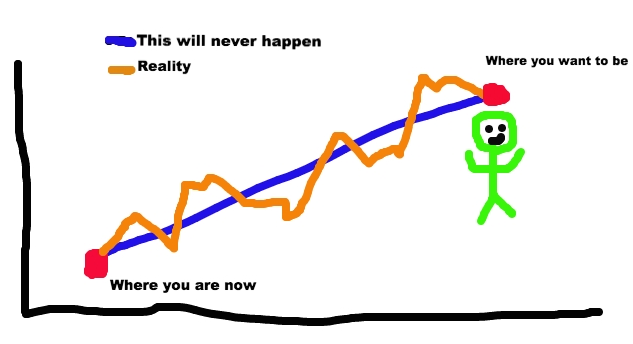Expectations and Progress
Progress isn’t linear. If it was, we’d all be able to roadmap success, follow the plan, and get there. As Dan John, notoriously coined, “Everything works, until it doesn’t”. Expecting that progress will dip and stall can keep you in a forward thinking mindset, able to adjust strategy when needed.
 |
| photo credit: bybibik.com via fitocracy |
The younger your training age, the faster you will see the results of your work. If you haven’t done anything and start doing something, you’re automatically at 100% gains. This is why so many people get tripped up on goal setting. All they can imagine is the future of where they want to be. They look only fleetingly at where they started or where they are. They are dishonest in their assessments, and self-preservingly so.
The magic bullet seems to be teenage boys. They have the hormonal profile to make huge progress in a very small amount of time. Their presumption that this trend will continue leads them to jump all over the place with their training. By following ten things they fail to achieve one.
 |
| photo credit: theproteinworks.com via Arnold Schwartzenegger |
Your action plan for achieving your goal should be as specific and measurable as the goal itself. What you’re measuring should define what you want. If you want to be leaner, take consistent photos. If you want to get stronger, measure the weight you’re able to move. If you want to fit into a certain size, use the sub-size of a certain item of clothing to test looseness. The exactness of your measurements dictates sureness of the path. Measuring steps allows you to resist the emotion of leaps and cultivate dependable data.
Once you’ve achieved your goal, progress can be measured in your ability to keep it. Are you able to do it with less rigidness, restrictions, and sacrifice? This is indeed progress. Making once hard things easy is the universal improvement. It’s something we can all strive for.



